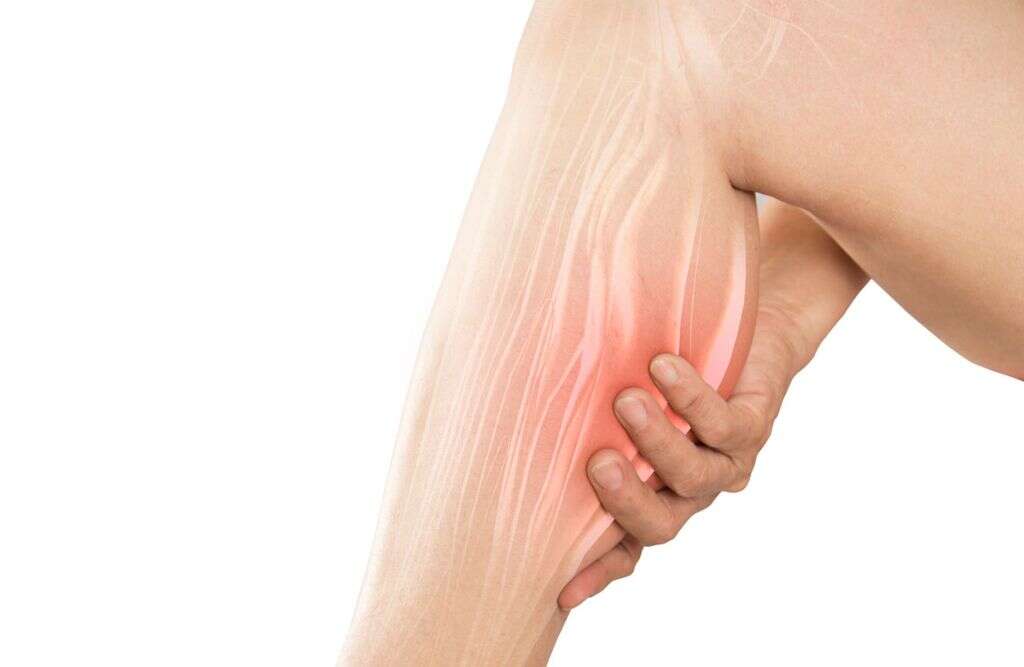What Causes Leg Cramps?
Sudden, sharp pain in your legs can be difficult to understand and may seem unavoidable. Whether you commonly experience leg cramps or just encountered your first one, it’s time to learn more about these unpleasant episodes.
Find out more about some of the most common causes and symptoms of cramps. Discover how you can reduce the risk of occurrence and manage the pain of these spasms throughout the day and night. Use this knowledge to control your misery and take steps to curtail further cramps. Don’t let debilitating leg pain stop you from exercising and enjoying a peaceful night’s sleep.

1. Symptoms of Leg Cramps
Cramps are an involuntary muscle spasm that causes intense discomfort and pain.1https://my.clevelandclinic.org/health/diseases/14170-leg-cramps These cramps rarely have any warning signs and can involve your entire leg. Your thigh, calf and foot can all be affected in a tight, painful spasm. Just like cramps in other parts of your body, leg cramps affect the muscles and come with no warning.
These experiences rarely cause serious or long-term issues. While painful, the spasm typically doesn’t last long and generally doesn’t damage your muscles or cause other serious issues. The pain can feel like your muscles are clenching, contracting or tightening into a knot. In severe cases, the muscles may be sore for hours after the cramp.

2. Common Triggering Experiences
Common occurrences that set off cramps can involve both lifestyle activities and medical conditions. In many cases, there aren’t any definite explanations for leg cramps.2https://www.healthline.com/health/pain-relief/what-causes-leg-cramps They are most often experienced at night, but they can also be brought on by exercise. Some cramping episodes occur at times when there doesn’t appear to be any triggering event.
Explore lifestyle and medical triggers to identify a frequent cause for your leg cramps. Understanding the triggering experience is key to finding a helpful prevention strategy. Consider visiting a doctor or other medical professional if you experience frequent leg cramps and can’t find a helpful approach for prevention.

3. Lifestyle Causes
Some activities may increase the risk of leg cramps. Running, weight training and sports activities appear to increase the prevalence of the cramps. If you’re participating in any of these activities, it’s important to review prevention strategies. This is particularly true of older adults.
These may be triggering causes due to muscle fatigue. As you participate in sports and other recreational pursuits, your legs may not receive the hydration and rest they need. Exercising while fatigued, dehydrated or without properly stretching may provoke leg cramps.

4. Possible Medical Causes
Even if you don’t participate in intense physical activities, you may still experience leg cramps. Pregnancy is another common risk factor that may cause spasms. Frequent leg cramps could be a sign of an underlying issue, so see your doctor if you’re pregnant and experience an unusual amount of cramps.
Medical conditions can also increase your risk of cramps. Cirrhosis, thyroid issues, kidney failure, Parkinson’s disease, vascular disease and medications related to these medical issues may be contributing to your leg cramps.

5. How Can I Reduce Leg Cramp Symptoms?
Thankfully, there are stretches you can perform to reduce the pain and tightness related to leg cramps.3https://www.health.harvard.edu/staying-healthy/take-that-muscle-cramps If the front of your lower leg begins cramping, try to stand and put your weight on your toes. Carefully lift your heels to stretch the affected muscle. Do not attempt this if you don’t feel safe to stand during your leg cramp.
Calf cramps are common during the night. Sit up in bed, create a loop with your blanket and loop it around your foot. Carefully pull your toes toward you and straighten your knee. This can provide relief for common nighttime cramps. Immediately stop stretching if this makes symptoms worse.

6. Are There Medical Treatment Options?
There aren’t currently any medical treatments for leg cramps. If you’re experiencing frequent cramps and long-lasting pain, speak to your doctor about possible underlying conditions. In most cases, cramps are a painful occurrence that isn’t caused by a life-threatening issue.
Your doctor may prescribe medication to relieve the pain, but stretching and prevention strategies remain the best ways to manage leg cramps. Most medical professionals no longer recommend using quinine tablets to reduce the risk of cramps since this medication comes with side effects and medication interactions that can be unpleasant or even dangerous.

7. How Can I Prevent Leg Cramps?
Cramps may be caused by a lack of potassium and magnesium in your diet. Eating foods rich in these minerals can reduce the risk of leg cramps. Find ways to add more leafy greens, black beans and bananas into your diet. Drink plenty of water throughout the day to avoid dehydration.
Stretching and keeping your feet warm at night are also prevention strategies. Stretch before and after any exercise routine and try wearing warm socks to bed. These tactics are great for the two most common sources of leg cramps: exercise and sleeping.

8. Why Do Leg Cramps Usually Happen at Night?
Your nighttime routine may increase your risk of cramps in several ways. Sleeping with your toes extended and your legs slightly bent can cause leg cramps. Many adults don’t drink enough water at night, which can result in dehydration. Nighttime is when your body is at rest after exercise, so it’s a time when lactic acid can build up in your legs.
Finally, sticking your feet out from under your blankets causes your feet to cool down. Cold feet constrict the blood vessels, which decreases blood flow. This reduces the amount of blood and oxygen that reaches your leg muscles and can precipitate a leg cramp.

9. Who Is Affected by Leg Cramps?
Older adults are at the highest risk of leg cramps. Women tend to get more of them than men. It’s estimated that 60% of adults and 40% of teens and children experience nighttime leg cramps.1https://my.clevelandclinic.org/health/diseases/14170-leg-cramps There are a few reasons why older individuals encounter a higher risk of cramping.
Your tendons shorten with age. Older individuals are also more likely to go to bed without drinking enough water in order to reduce trips to the bathroom. Increased medication use and exercise routines that fatigue leg muscles are more common as you age.

10. Are There Warning Signs for Leg Cramps?
Unfortunately, leg cramps tend to occur without warning. Sudden pain is difficult to predict, so it’s important to practice prevention strategies and use careful stretching to relieve the worst of the symptoms.
Proper hydration, nutrition and stretching remain the best ways to prevent leg cramps. Because you can’t predict them, it’s important to do everything you can to prevent them. Don’t hesitate to contact your doctor if you’re concerned with the severity and number of cramps.












